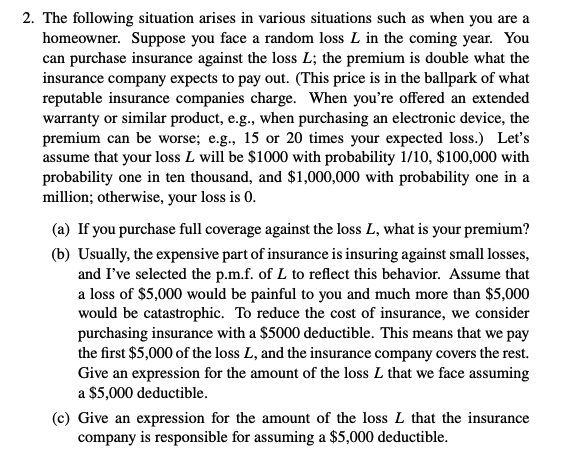2. The following situation arises in various situations such as when you are a homeowner. Suppose you face a random loss L in the coming year. You can purchase insurance against the loss L; the premium is double what the insurance company expects to pay out. (This price is in the ballpark of what reputable insurance companies charge. When you're offered an extended warranty or similar product, e.g., when purchasing an electronic device, the premium can be worse; e.g., 15 or 20 times your expected loss.) Let's assume that your loss L will be $1000 with probability 1/10, $100,000 with probability one in ten thousand, and $1,000,000 with probability one in a million; otherwise, your loss is 0. (a) If you purchase full coverage against the loss L, what is your premium? (b) Usually, the expensive part of insurance is insuring against small losses, and I've selected the p.m.f. of L to reflect this behavior. Assume that a loss of $5,000 would be painful to you and much more than $5,000 would be catastrophic. To reduce the cost of insurance, we consider purchasing insurance with a $5000 deductible. This means that we pay the first $5,000 of the loss L, and the insurance company covers the rest. Give an expression for the amount of the loss L that we face assuming a $5,000 deductible. (c) Give an expression for the amount of the loss L that the insurance company is responsible for assuming a $5,000 deductible.
2. The following situation arises in various situations such as when you are a homeowner. Suppose you face a random loss L in the coming year. You can purchase insurance against the loss L; the premium is double what the insurance company expects to pay out. (This price is in the ballpark of what reputable insurance companies charge. When you're offered an extended warranty or similar product, e.g., when purchasing an electronic device, the premium can be worse; e.g., 15 or 20 times your expected loss.) Let's assume that your loss L will be $1000 with probability 1/10, $100,000 with probability one in ten thousand, and $1,000,000 with probability one in a million; otherwise, your loss is 0. (a) If you purchase full coverage against the loss L, what is your premium? (b) Usually, the expensive part of insurance is insuring against small losses, and I've selected the p.m.f. of L to reflect this behavior. Assume that a loss of $5,000 would be painful to you and much more than $5,000 would be catastrophic. To reduce the cost of insurance, we consider purchasing insurance with a $5000 deductible. This means that we pay the first $5,000 of the loss L, and the insurance company covers the rest. Give an expression for the amount of the loss L that we face assuming a $5,000 deductible. (c) Give an expression for the amount of the loss L that the insurance company is responsible for assuming a $5,000 deductible.
Algebra & Trigonometry with Analytic Geometry
13th Edition
ISBN:9781133382119
Author:Swokowski
Publisher:Swokowski
Chapter10: Sequences, Series, And Probability
Section10.8: Probability
Problem 32E
Related questions
Question

Transcribed Image Text:2. The following situation arises in various situations such as when you are a
homeowner. Suppose you face a random loss L in the coming year. You
can purchase insurance against the loss L; the premium is double what the
insurance company expects to pay out. (This price is in the ballpark of what
reputable insurance companies charge. When you're offered an extended
warranty or similar product, e.g., when purchasing an electronic device, the
premium can be worse; e.g., 15 or 20 times your expected loss.) Let's
assume that your loss L will be $1000 with probability 1/10, $100,000 with
probability one in ten thousand, and $1,000,000 with probability one in a
million; otherwise, your loss is 0.
(a) If you purchase full coverage against the loss L, what is your premium?
(b) Usually, the expensive part of insurance is insuring against small losses,
and I've selected the p.m.f. of L to reflect this behavior. Assume that
a loss of $5,000 would be painful to you and much more than $5,000
would be catastrophic. To reduce the cost of insurance, we consider
purchasing insurance with a $5000 deductible. This means that we pay
the first $5,000 of the loss L, and the insurance company covers the rest.
Give an expression for the amount of the loss L that we face assuming
a $5,000 deductible.
(c) Give an expression for the amount of the loss L that the insurance
company is responsible assuming a $5,000 deductible.
Expert Solution
This question has been solved!
Explore an expertly crafted, step-by-step solution for a thorough understanding of key concepts.
This is a popular solution!
Trending now
This is a popular solution!
Step by step
Solved in 4 steps

Recommended textbooks for you

Algebra & Trigonometry with Analytic Geometry
Algebra
ISBN:
9781133382119
Author:
Swokowski
Publisher:
Cengage

College Algebra
Algebra
ISBN:
9781305115545
Author:
James Stewart, Lothar Redlin, Saleem Watson
Publisher:
Cengage Learning

Algebra & Trigonometry with Analytic Geometry
Algebra
ISBN:
9781133382119
Author:
Swokowski
Publisher:
Cengage

College Algebra
Algebra
ISBN:
9781305115545
Author:
James Stewart, Lothar Redlin, Saleem Watson
Publisher:
Cengage Learning